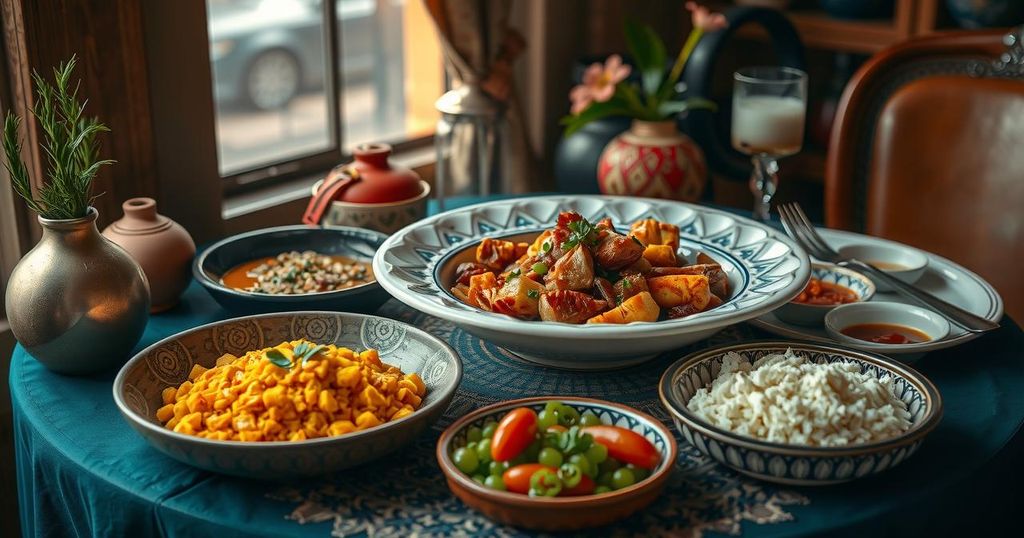Kazakh Cuisine: A Reflection of Cultural Heritage and Hospitality

Kazakh cuisine is deeply rooted in the culture and tradition of Kazakhstan, with an emphasis on meat, especially horse meat. The recent recognition of Almaty’s Auyl restaurant highlights the neo-nomadic spirit of the food, showcasing local dishes like beshbarmak and baursak that underpin familial and cultural connections. Visitors are encouraged to experience both gourmet dining and the warmth of home-cooked meals to fully understand the essence of Kazakh hospitality.
Kazakh cuisine is more than merely a meal; it is deeply intertwined with the cultural identity and essence of home for the Kazakh people. Almaty’s Auyl restaurant has recently gained international acclaim, being recognized amongst the 16 Most Beautiful Restaurants in the World by Prix Versailles. Aida Haidar, in an article for The Astana Times, emphasizes that local food offers visitors a taste of this unique heritage, characterized largely by its reliance on meat, particularly horse meat, which evokes both intrigue and nostalgia for many. Central to the culinary experience is the understanding of Kazakhstan’s climate, wherein meat has traditionally served as a vital source of nutrition, particularly during the harsh winters. Haidar recounts her adventures and her open-minded approach to sampling local delicacies, urging visitors to embrace Kazakh cuisine without preconceived notions. Kazakhstan has long been a melting pot of cultures, owing much to the historic significance of the Great Silk Road, which fostered a rich cultural exchange that continues to influence the nation’s culinary landscape. Changing tastes over the past two decades have brought Kazakh cuisine back to the forefront, with numerous restaurants passionately celebrating local customs and ingredients through innovative yet traditional dishes. Auyl restaurant stands out in Almaty for its neo-nomadic design and culinary offerings such as baursak and beshbarmak. These dishes, rich in flavors and cultural significance, echo the past while highlighting the warmth of hospitality, reminiscent of gatherings around a yurt. The experience of enjoying beshbarmak, a dish often made with horse meat and dough, contributes to familial bonds and creates a comforting ambiance that is inherently Kazakh. In Astana, Qazaq Gourmet presents visitors the concept of culinary rejuvenation, where the traditional horse meat broth amplifies the communal experience of dining. Likewise, the Selfie restaurant, merging modern designs with authentic Kazakh flavors, offers dishes that celebrate local ingredients, all while indulging in astounding city views. Additionally, the traditional Kazakh tea culture is encapsulated in a unique ice cream, providing a taste of home in a delightful manner. Ultimately, Aida Haidar encourages travelers not only to indulge in the culinary delicacies offered at fine establishments but also to engage with locals. By establishing friendships with Kazakhs, visitors may be invited to experience the true essence of home-cooked meals, where the heart of Kazakh cuisine truly lies. Chef Evgeniy Chekanin’s sentiments echo this belief; the most extraordinary beshbarmak he tasted was not crafted in a high-end restaurant but shared within a humble home, emphasizing that food remains a profound expression of connection and belonging.
Kazakh cuisine has evolved over centuries, heavily influenced by the historical nomadic lifestyle of the Kazakh people and the severe climatic conditions of the region. Traditionally reliant on livestock, specifically horses, meat has served as a staple food source, essential for sustenance. The advent of modern restaurants has contributed to a culinary renaissance, leading to a resurgence in interest towards traditional foods celebrated in contemporary settings. The rich flavors and cultural significance of Kazakh dishes exemplify the connection between food and identity, making culinary exploration a central element of visiting Kazakhstan.
In conclusion, Kazakh cuisine is a testament to the nation’s rich cultural heritage and the significance of food as a symbol of home and community. Both local and foreign visitors are encouraged to explore not only the diverse culinary offerings present in restaurants such as Auyl and Qazaq Gourmet but also to establish personal connections that reveal the depth of Kazakh hospitality. The emphasis on traditional flavors and the continuity of culinary customs reflect Kazakhstan’s storied history, evoking a sense of belonging for all who partake in its meals.
Original Source: astanatimes.com








